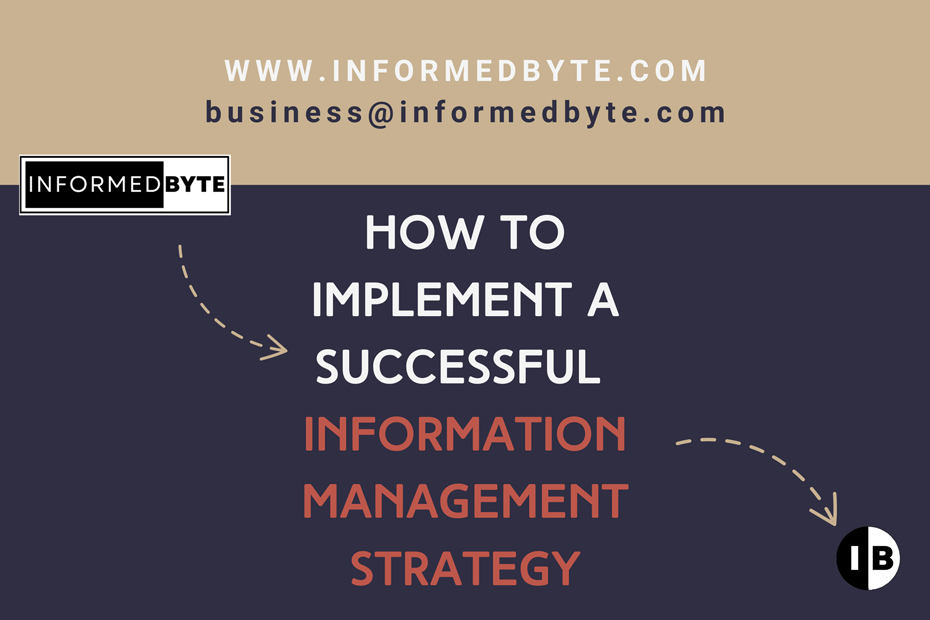How to Implement a Successful Information Management Strategy
April 8, 2025
Implementing a successful information management strategy is crucial for any organisation aiming to optimise its operations, enhance decision-making, and maintain a competitive edge. This comprehensive guide will provide you with the essential steps and considerations to develop and implement an effective information management strategy.

Image credit by Gerd Altmann from Pixabay
Understanding Information Management
Information management involves the systematic collection, organisation, storage, and dissemination of information. It ensures that the right information is available to the right people at the right time, thereby facilitating informed decision-making and efficient operations. A successful information management strategy aligns with your organisation's goals and objectives, leveraging technology and best practices to manage information throughout its lifecycle.
Key Components of an Information Management Strategy
Assessment of Current State: Begin by assessing your organisation's current information management practices. Identify strengths, weaknesses, opportunities, and threats. A good starting point is a SWOT analysis. This assessment will help you understand the existing gaps and areas that need improvement.
Defining Objectives and Goals: Clearly define the objectives and goals of your information management strategy. These should align with your organisation's overall mission and vision. Objectives may include improving data accuracy, enhancing data security, increasing accessibility, and ensuring compliance with regulations.
Stakeholder Engagement: Engage key stakeholders, including senior management, IT staff, and end-users, in the planning process. Their input and support are crucial for the successful implementation of the strategy. Conduct workshops, surveys, and interviews to gather their insights and address their concerns.
Information Governance: Establish a robust information governance framework that outlines policies, procedures, and standards for managing information. This framework should cover data quality, data privacy, data security, and data retention. Assign roles and responsibilities to ensure accountability and compliance.
Technology Infrastructure: Invest in the right technology infrastructure to support your information management strategy. This includes hardware, software, and network resources. Consider implementing enterprise content management (ECM) systems, data management platforms, and collaboration tools to streamline information processes.
Data Quality Management: Ensure the accuracy, completeness, and consistency of your data through data quality management practices. Implement data validation, data cleansing, and data enrichment processes to maintain high-quality data. Regularly monitor and audit data quality to identify and rectify issues.
Information Security: Protect your organisation's information assets by implementing robust information security measures. This includes access controls, encryption, firewalls, and intrusion detection systems. Conduct regular security assessments and training programs to mitigate risks and ensure compliance with security standards.
Change Management: Implementing a new information management strategy often requires significant changes in processes and culture. Develop a change management plan to address resistance and ensure smooth adoption. Communicate the benefits of the strategy, provide training, and offer support to employees during the transition.
Performance Measurement: Establish key performance indicators (KPIs) to measure the success of your information management strategy. Monitor and evaluate these KPIs regularly to track progress and identify areas for improvement. Use feedback from stakeholders to refine and optimise the strategy.
Continuous Improvement: Information management is an ongoing process that requires continuous improvement. Stay updated with industry trends, emerging technologies, and best practices. Regularly review and update your information management strategy to adapt to changing business needs and technological advancements.
Implementing the Strategy
Develop an Implementation Plan: Create a detailed implementation plan that outlines the steps, timelines, and resources required for executing the strategy. Assign responsibilities to team members and establish a project management framework to ensure effective coordination and monitoring.
Pilot Testing: Conduct pilot tests to validate the effectiveness of the strategy and identify potential issues. Select a small group of users or departments to participate in the pilot phase. Gather feedback and make necessary adjustments before rolling out the strategy organisation-wide.
Training and Support: Provide comprehensive training to employees on the new information management practices and tools. Offer ongoing support through help desks, user manuals, and online resources. Encourage a culture of continuous learning and improvement.
Rollout and Communication: Roll out the strategy in phases to minimise disruption and ensure a smooth transition. Communicate the rollout plan to all stakeholders and keep them informed of progress and milestones. Address any concerns or challenges promptly to maintain momentum and support.
Monitoring and Evaluation: Continuously monitor the implementation process and evaluate its impact on your organisation's operations. Use the established KPIs to measure success and identify areas for improvement. Conduct regular reviews and update the strategy as needed to ensure its continued relevance and effectiveness.
How Can Informed Byte Help
Informed Byte is dedicated to helping organisations implement successful information management strategies. Our team of experts provides comprehensive support throughout the entire process, from initial assessment to continuous improvement. Here’s how we can assist you:
Assessment and Planning: We conduct thorough assessments of your current information management practices, identifying strengths and areas for improvement. Our experts work with you to define clear objectives and goals that align with your organisation's mission and vision.
Stakeholder Engagement: We can facilitate stakeholder engagement through workshops, surveys, and interviews, ensuring that all key stakeholders are involved in the planning process. This collaborative approach helps address concerns and gather valuable insights.
Information Governance: Informed Byte helps you establish a robust information governance framework, including policies, procedures, and standards for managing information. We ensure that your data quality, privacy, security, and retention practices are up to industry standards.
Technology Infrastructure: Our team assists in independent selection and implementation of the right technology infrastructure to support your information management strategy. We recommend and deploy enterprise content management (ECM) systems, data management platforms, and collaboration tools tailored to your needs.
Data Quality Management: We implement data quality management practices to ensure the accuracy, completeness, and consistency of your data. Our services include data validation, cleansing, and enrichment processes, along with regular monitoring and auditing.
Information Security: Informed Byte provides robust information security measures, including access controls, encryption, firewalls, and intrusion detection systems. We conduct regular security assessments and training programs to mitigate risks and ensure compliance with security standards.
Change Management: Our change management plans address resistance and ensure smooth adoption of new information management practices. We communicate the benefits of the strategy, provide training, and offer ongoing support to employees during the transition.
Performance Measurement and Continuous Improvement: We help you establish key performance indicators (KPIs) to measure the success of your information management strategy. Our team continuously monitors and evaluates these KPIs, providing feedback and recommendations for ongoing improvement.
By partnering with Informed Byte, you can develop and implement a robust information management strategy that enhances data quality, security, and accessibility, ultimately driving better decision-making and operational efficiency. Let us help you navigate the complexities of information management and achieve your organisational goals. Contact us today business@informedbyte.com
Contact us for success
